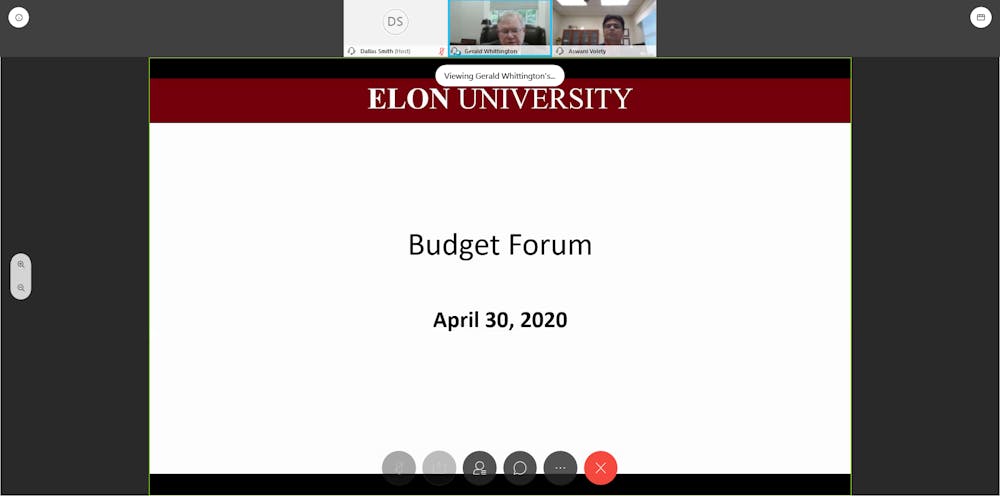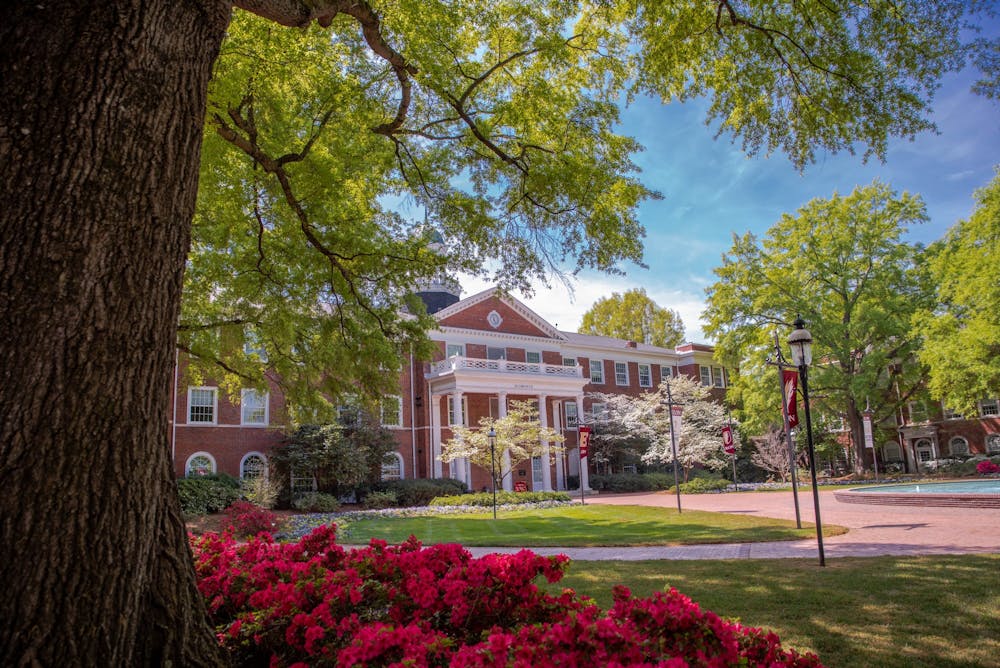The Elon University budget committee hosted a community-wide budget forum to address the ongoing financial impact of the coronavirus. The forum explained the estimated $13.5 million in student refunds and a possible 5% budget reduction for the upcoming fiscal year.
Senior Vice President Gerald Whittington and Provost Aswani Volety presented the April 30 budget forum to over 350 faculty and staff. The budget committee — chaired by Volety and made up of eight faculty and staff members — serves as an advisory committee to President Connie Book and the Board of Trustees. The committee meets throughout the year to develop budget models for the university, and holds forums to update the community on the budget, as well as to receive feedback.

The Elon University budget committee hosted a campus-wide budget forum on April 30. Provost Aswani Volety, chair of the budget committee, and Gerald Whittington, senior vice president, hosted the forum, which was attended by over 340 faculty and staff.
The budget committee has been working with a committee of Board of Trustees members to plan for multiple scenarios in response to the negative financial impact the coronavirus has had on the university.
“The virus is going to determine our timeline about choosing between scenarios,” Whittington said.
Students are allowed to request credits or refunds for unused housing and meal plan costs through May 20. The decision, sent to students via email by Vice President for Student Life Jon Dooley, allows returning students to apply their unused meal plans and housing credits to the summer or fall semester.
Students in residence halls and campus apartments who did not return after classes resumed online March 23 will be eligible to receive credits based on their move-out date. Returning students will not receive cash refunds; however the more than 1,500 graduating seniors, or students leaving Elon may request a refund through their OnTrack account, which will be paid through direct deposit.
Whittington said in the forum that the cost for refunds is estimated to be as much as $13.5 million. The university has 6,277 undergraduate students and because the university allowed students to remain on campus following the switch to online learning, the cost for refunds varies student to student, depending on how much time a student spent on campus and whether or not they used their meal plan.
“We will know precisely how much this is when all of our students finish requesting their credit,” Whittington said during the forum. “Each one of the students is a special case.”
The university response outlined in the forum includes deferment of projects such as the new engineering buildings detailed in the 2030 strategic plan, as well as a hiring frost and spending freeze.
For the upcoming fiscal year of 2021, the university will be looking at scenarios to reduce the budget by 5% or more. Of the $274 million dollar budget for 2021, a 5% budget reduction would be approximately $14.4 million.
“We would be looking at how we would go about, for the year 2021, the budget that has already been approved by the board, how would we walk that back?” Whittington said. “Such that we could affect a 5% reduction of that.”
The budget committee will focus on “preserving the teaching and learning environment.”
The forum prioritized full-time employment, including a 2% raise pool the university hopes to offer in October, financial aid and mandatory program and operational expenses, such as utilities.
“Every scenario involves what does it take to provide the students with the best experience possible,” Volety said.
When planning for the future, Whittington said given 96% of the university’s revenue comes from students in the form of tuition, fees, dining and residence hall payments, student enrollment will be critical.
“For every 1% drop in retention of existing students, that is a reduction of revenue of about $2 million,” Whittington said.
Many institutions have extended the deposit deadline for the class of 2024. For students who request an extension, the university will be granting extensions for first-year deposits through May 15.
The university is looking at possible reductions in upcoming years, in addition to necessary costs, such as personal protection equipment for students, faculty and staff, barriers for social distancing and a loan fund for students.
Whittington said during the forum that the university has already begun trying to find vendors for PPE, as well as looking into plexiglass barriers for office spaces and public spaces where people will be in close contact with one another. The university’s fall 2020 task force, led by President Emeritus Leo Lambert, is working on plans to resume on-campus instruction and residence life in the fall.
The university is also looking into a loan fund of about $3 million for students already enrolled at Elon, who may not be able to continue or complete their education.
“First and foremost is students and student experiences… that’s our primary focus,” Volety said. “It’s tempting to take the easy way out, but I don’t think we want to make those difficult choices if we don’t have to.”


